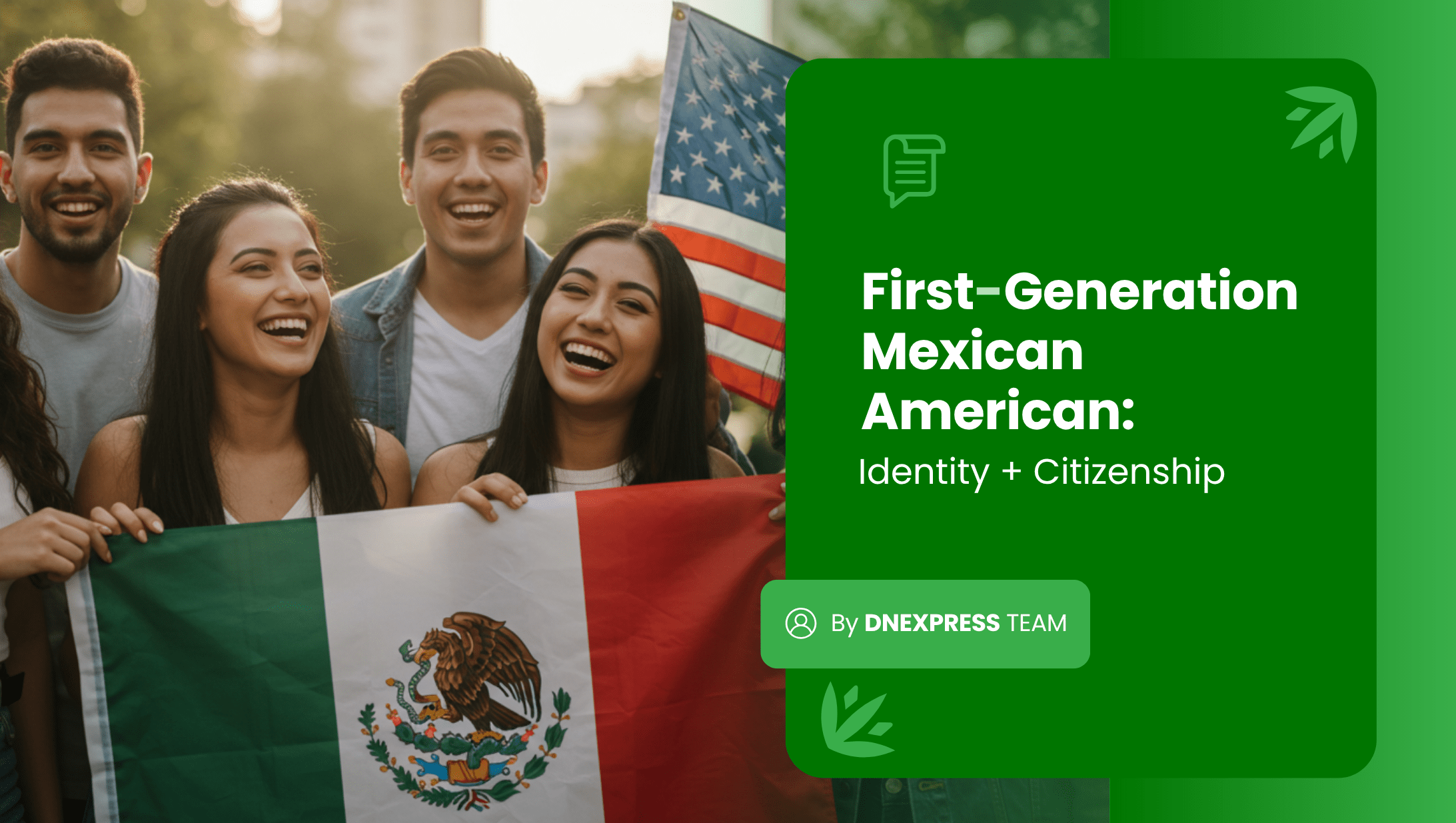
What Is a First-Generation Mexican American? A first-generation Mexican American is someone born in the United States to at least one parent born in Mexico. While they are U.S. citizens by birth, their cultural, emotional, and often legal ties to Mexico remain strong.
Most grew up speaking English at school and Spanish at home, switching between languages and identities depending on the setting. It's common to feel like they're “not American enough” in one context and “not Mexican enough” in another.
Yet what many don't realize is that their status also comes with legal opportunities. If you are a first-gen Mexican American, you likely qualify for Mexican citizenship through your parent's nationality, even if you were never registered in Mexico, even if your parent has passed away, and even if the consulate told you it was too late.
First-gen identity extends beyond cultural boundaries, it's legal. It can unlock a second passport, legal rights in two countries, and the ability to pass citizenship to your own children.
Whether you're reconnecting with your roots, trying to register your children as Mexican citizens, or seeking to fix past rejections from the consulate, understanding your generational status is the first step. This identity extends beyond cultural boundaries; it carries legal rights and opportunities.
We help people in all of these categories. If you're overwhelmed by legal jargon, missing paperwork, or fear the consulate will reject you again, we specialize in getting it done legally, affordably, and without needing your parent to appear.
Want the full breakdown? Keep reading. We'll walk you through what it means to be first-gen, how to qualify for citizenship, and how to avoid the common pitfalls people face when trying to do this on their own.
What It Means to Be a First-Gen Mexican American
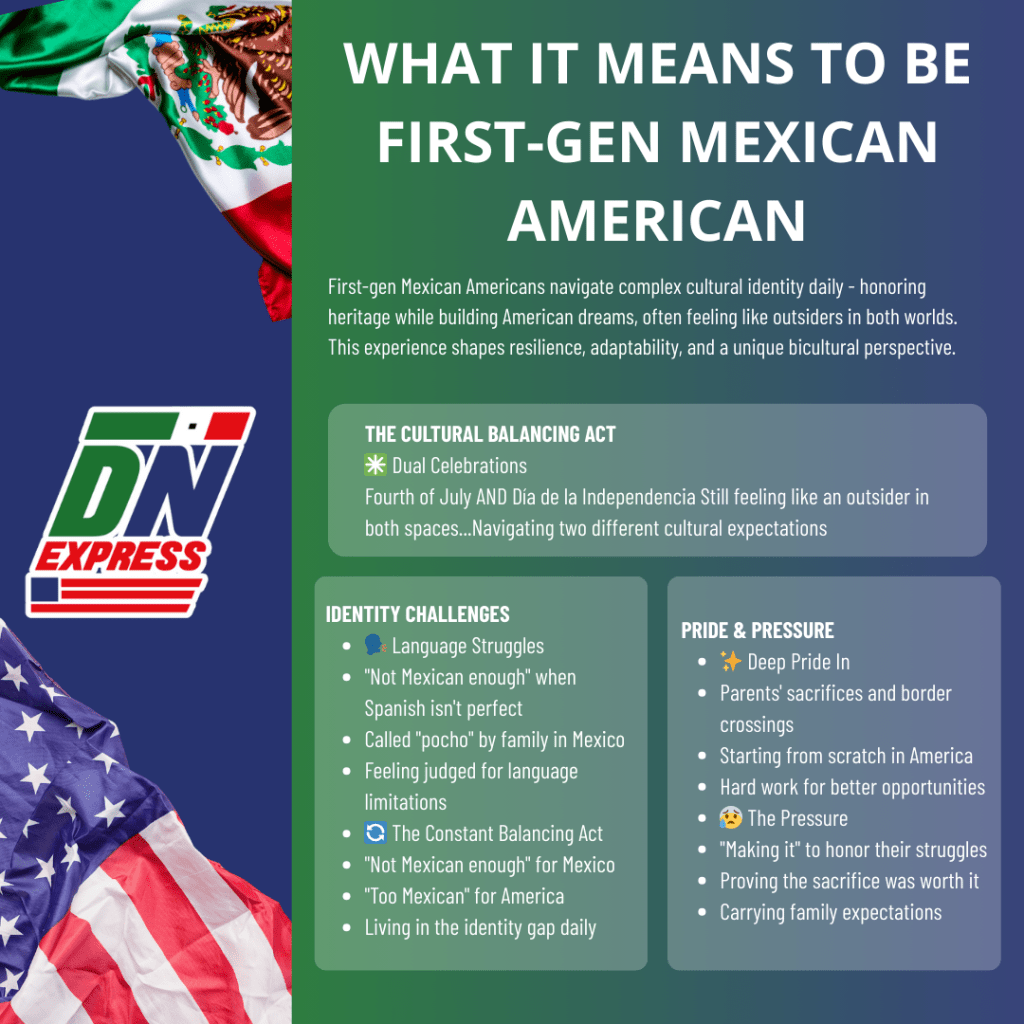
Cultural Identity & Pride
For many, being a first-generation Mexican American means living in-between. You're “ni de aquí, ni de allá,” not fully from here, not fully from there.
You might celebrate the Fourth of July and Día de la Independencia in the same breath, but still feel like an outsider in both spaces.
There's often a deep pride in your parents' sacrifices, crossing borders, starting from scratch, doing hard jobs to give you a better life. That pride comes with pressure.
You may feel you have to “make it” in America to honor their struggles.
But what happens when you don't speak perfect Spanish? Or when your family in Mexico calls you pocho?
It's common to feel “not Mexican enough” for Mexico, and “too Mexican” for America. That identity gap is a constant balancing act.
Everyday Challenges
First-gen life is rich, but it comes with unique challenges. Most of us grew up switching between English and Spanish daily.
We helped translate at the doctor's office, filled out forms for our parents, and navigated systems no one taught us.
This language duality is a gift, but it can also feel like a burden. You're fluent in both but sometimes insecure in each, depending on the situation.
Discrimination can come from both sides. From classmates who mock your heritage, and from relatives who say you've “forgotten where you came from.”
It's exhausting and confusing.
Research from the University of Texas shows that first-generation Mexican American students face unique identity development challenges. And then there's the mental health piece. Anxiety and depression are genuine concerns.
But many of us were raised in homes where those words weren't even spoken. When your family believes in “echale ganas” as the cure for everything, asking for help can feel like weakness.
Generational Terms Explained (With Examples)
Formatted to clearly answer common search queries and drive featured snippet potential.
If you've ever asked yourself, “Am I first or second generation?”, many people share this confusion. These labels can be confusing, especially for Mexican Americans raised in the U.S.
Let's break down what each generation means and how it may affect your legal rights.
What Is a First-Generation Mexican American?
If you were born in the U.S., and at least one of your parents was born in Mexico, you're considered first-generation Mexican American.
This group is often uniquely positioned. You're American by birth, but you may qualify for Mexican citizenship through your parent, even if they never registered you.
According to statistics from BestColleges, roughly 51% of Hispanic and Latino students are first-generation college students. In fact, many people in this category are surprised to learn that they've been eligible all along.
What Is a Second-Generation Mexican American?
Second-generation typically refers to people born in the U.S. whose parents were also born in the U.S., but whose grandparents immigrated from Mexico.
While you may still feel deeply connected to your heritage, qualifying for Mexican citizenship becomes trickier here. You'd need to prove your lineage, often through recovered or corrected documents.
Third & Fourth Generation
- Third Generation: Grandchildren of Mexican immigrants.
- Fourth Generation: Great-grandchildren or beyond, usually with stronger cultural assimilation and less connection to Mexican legal pathways unless documentation is preserved.
By the third or fourth generation, applying for Mexican citizenship becomes rare unless proactive steps were taken earlier to preserve legal ties.
1st vs 2nd vs 3rd Generation
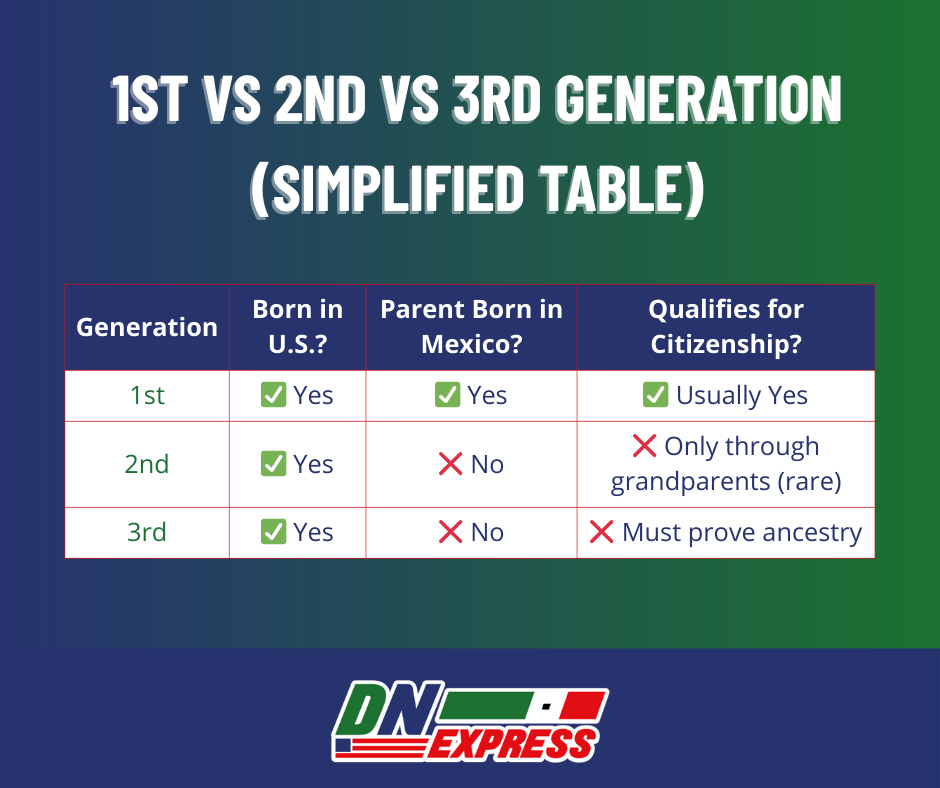
Pro Tip: If you're not sure which category you fall into, or whether you qualify for Mexican nationality, Doble Nacionalidad Express can review your documents and confirm it for you, free of charge.
Can a First-Gen Mexican American Get Mexican Citizenship?
Yes, and It's Easier Than You Think
If you were born in the U.S. to a Mexican parent, you are likely eligible for Mexican citizenship, even if you've never been to Mexico, don't speak Spanish fluently, or thought you missed the window.
Under Mexican law, children born abroad to Mexican citizens have a constitutional right to claim nationality. This process goes beyond a loophole or temporary program; it's a legal path rooted in Article 30 of the Mexican Constitution.
Even better? With the right legal support, the entire process can be handled remotely.
No consulate visits. No need to involve your parents. No travel to Mexico.
Our team helps first-gen clients reclaim their nationality every day, even those who were told “no” by the consulate or thought they were too late.
Why You Shouldn't Do It Alone
The Risks of DIY Citizenship Applications
Applying for Mexican citizenship seems simple, until it becomes complicated. Many people start the process on their own, only to hit a wall:
- Applications rejected by consulates over small document errors.
- Delays due to name mismatches, misspellings, or outdated forms.
- Confusion about registro civil types, translations, and apostilles.
- No one tells you that your birth certificate from Texas needs to match your parent's Mexican record letter-for-letter.
After months or even years of trying, many people give up.
The system wasn't built to be easy. But that doesn't mean you're stuck.
Why DNExpress Is Different
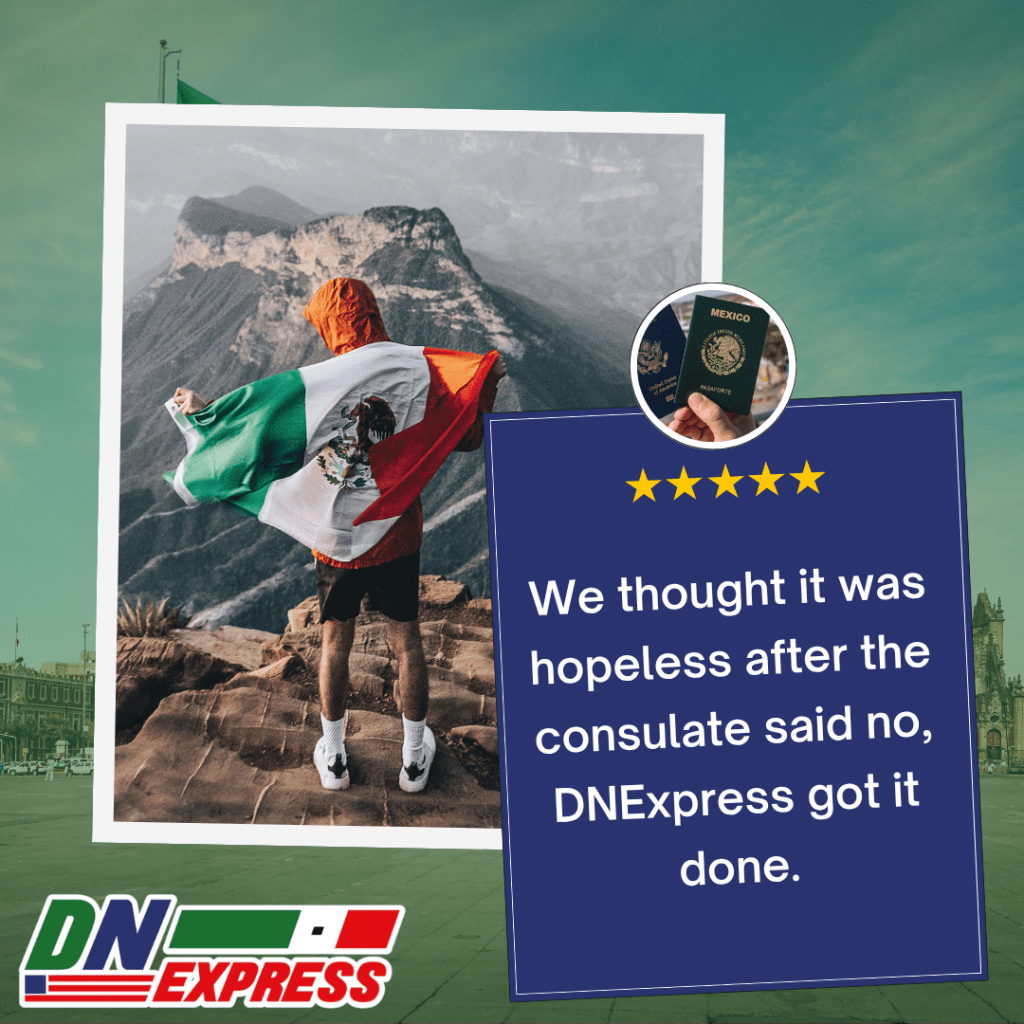
Our team at Doble Nacionalidad Express has built a system designed for people exactly like you, first-gen Mexican Americans who want results without the runaround.
Here's how we do it better:
✅ No consulate appointments (seriously, you never have to step foot in one)
✅ No need for your parent to appear or sign anything
✅ Affordable, transparent pricing with zero surprise fees
✅ Licensed Mexican attorneys who understand both U.S. and Mexican law
✅ Fast, bilingual support via phone, WhatsApp, or email
✅ Specialists in denied or difficult cases, we fix what others can't
✅ Everything is handled in-house, no outsourcing, ever
“I thought it was hopeless, but they fixed my birth certificate, got my nationality approved, and I never had to leave my home.” First-gen client, San Diego
We've helped people who had nothing but a blurry birth certificate and turned that into full Mexican nationality, a passport, and peace of mind.
Ready to Claim What's Yours?
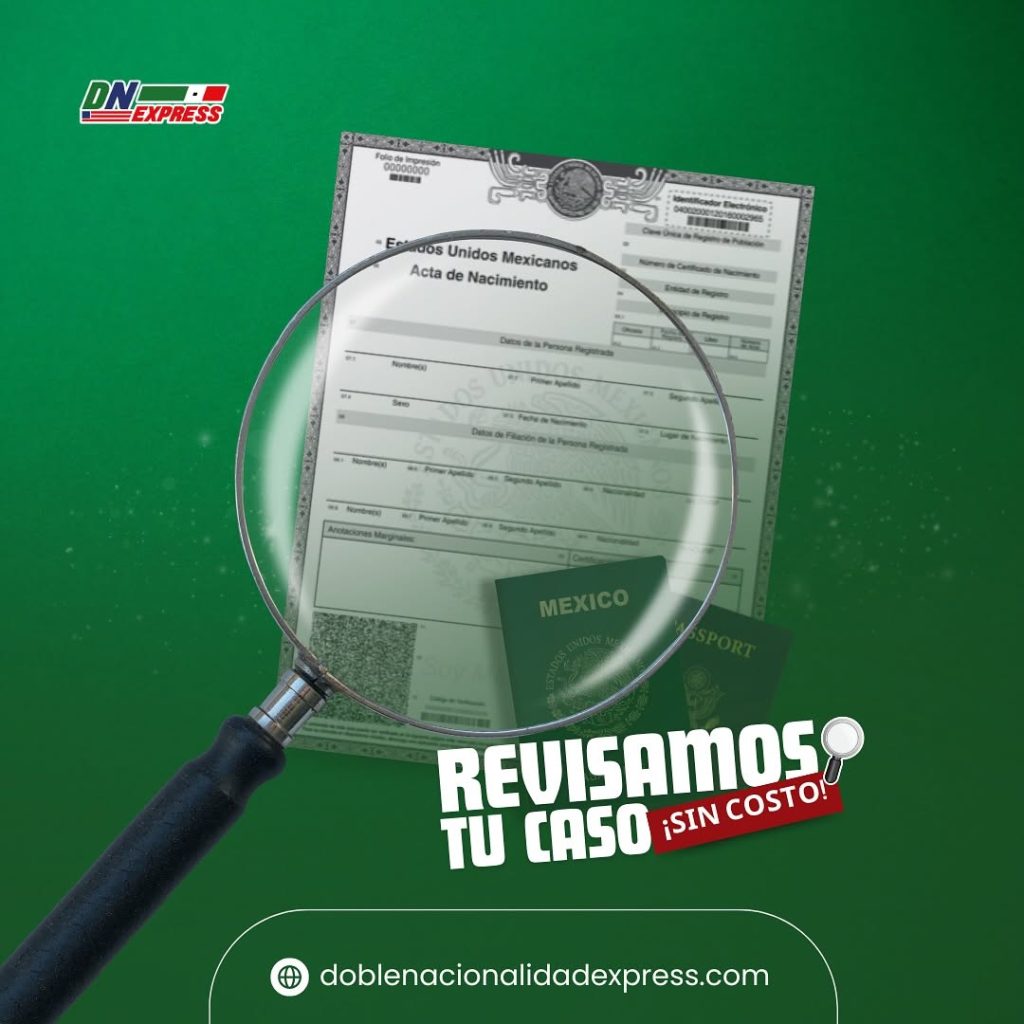
What to Do Next
Whether you're learning about your eligibility for the first time or have already been rejected by the consulate, you have options and support available. We've helped thousands of first-gen Mexican Americans and their families finally get the answers and legal recognition they deserve.
Here's how you can move forward:
✍️ Still not sure if you qualify? → Schedule a Free Case Review
📄 Missing documents or denied before? → Let us review your case
📞 Need quick answers? → Call or Message Us on WhatsApp
We'll look at your situation, check your eligibility, and build a plan. No pressure, no fluff, and no need to visit the consulate.
This Goes Beyond Paperwork
For many of our clients, getting their Mexican citizenship goes beyond travel benefits or legal rights. It's personal.
It's about finally being seen by both countries you call home.
“Reclaiming your citizenship is reclaiming your identity. It's giving yourself and your kids legal and emotional recognition on both sides of the border.”
Our team at Doble Nacionalidad Express takes pride in helping you honor your parents' sacrifices, preserve your heritage, and pass something powerful on to the next generation.
FAQ
We hear these concerns all the time. Here's the truth behind each one:
What if my parent passed away or I'm estranged?
You can still qualify. We specialize in cases where the parent is unavailable, deceased, or no longer in contact.
Do I need my parent's documents or permission?
Not necessarily. If you don't have your parent's help, we can often recover their Mexican birth certificate or find legal workarounds to prove lineage.
What if I was denied before?
Many of our clients came to us after a rejection. In most cases, it was due to small paperwork issues or misinformed staff. We can fix it and reapply correctly.
Is it still worth it if I don't speak Spanish?
Yes. Citizenship does not tie to language fluency. It's about your legal right and your cultural connection. We've helped hundreds in the same situation.
Will I lose my U.S. citizenship?
Absolutely not. The U.S. allows dual citizenship. Claiming Mexican nationality does not cancel your U.S. passport or rights.
Can I pass it to my children?
Yes, and this is one of the most common reasons people apply. If you claim citizenship now, your U.S.-born children may also be eligible through you.
It's worth noting that Mexico's 2021 constitutional reform expanded nationality rights for descendants of Mexican nationals born abroad. For additional information about dual citizenship considerations, you can also read about potential challenges and learn more in our FAQ.



